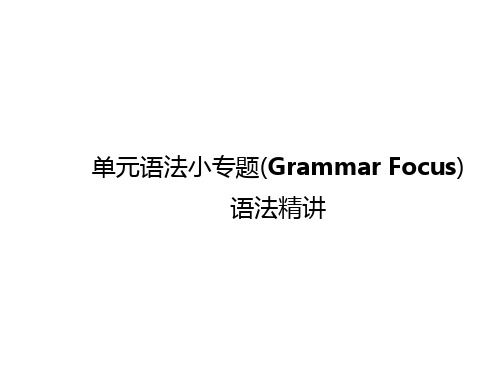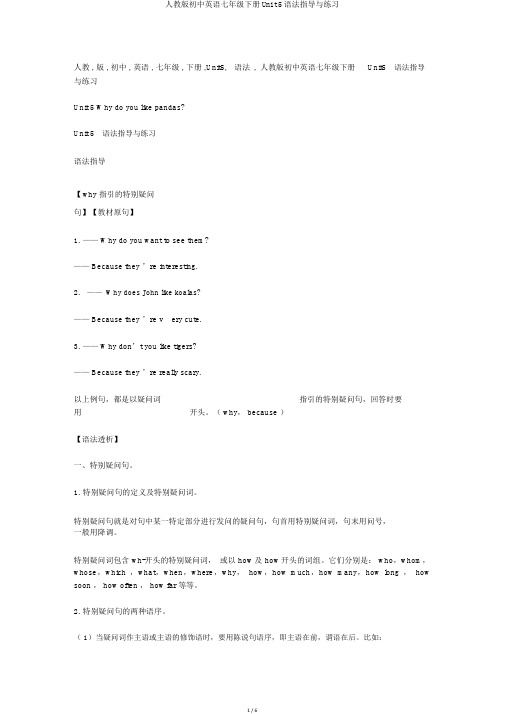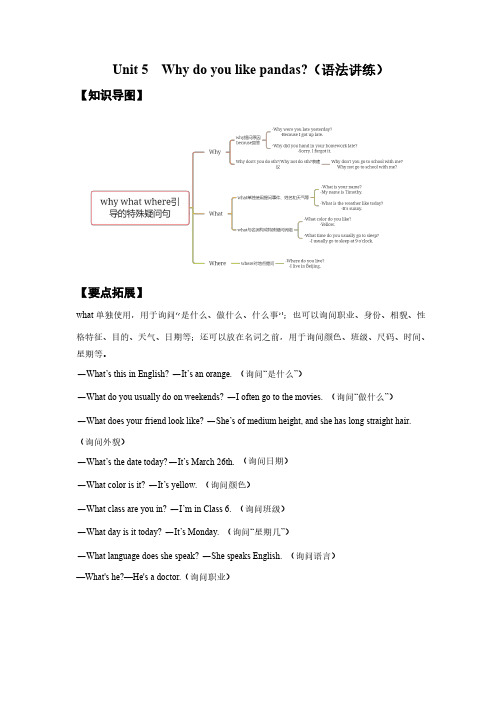七年级(贵州)英语人教版练习:Unit 5 单元语法小专题
人教版七年级英语上册:Unit5 单元语法小专题【练习】

单元语法小专题(Grammar Focus~3c),01语法精讲一般现在时中实义动词have的用法在英语中,表示现在的状态或表示经常或习惯性动作的句子要用一般现在时。
另外,表示主语具备的某种性格和能力的句子也要用一般现在时。
在一般现在时中,往往含有always,often(经常),usually(通常),every day(每天)等标志词。
have作实义动词,意为“有;拥有”,表示所属关系,有人称和数的变化。
它的一般现在时的各种句式如下:1.肯定句:主语+have/has…have用于复数名词、第一人称单复数、第二人称单复数或第三人称复数代词作主语的句子中;has为have的第三人称单数形式,用于不可数名词、可数名词单数或第三人称单数代词作主语的句子中。
例如:I have a red telephone.我有一部红色的电话。
He has a brother.他有一个哥哥。
2.否定句:主语+don't/doesn't+have…例如:We don't have the key.我们没有钥匙。
She doesn't have a tennis ball.她没有网球。
3.一般疑问句:Do/Does+主语+have…?肯定回答:Yes,主语+do/does.否定回答:No,主语+don't/doesn't.【注意】在一般疑问句结构中,常借助助动词do,当主语是第三人称单数时,助动词用does。
例如:—Does Eric have an uncle?埃里克有叔叔吗?—Yes,he does.是的,他有。
—Do they have a computer?他们有电脑吗?—No,they don't.不,他们没有。
,02同步精练Ⅰ.用have,has,do,does,don't或doesn't填空。
1.I have a book and he has a pen.2.They have a TV.They don't have a radio.3.She has a CD player.It's on the desk.4.I don't have a computer,but Tom has one.5.—Does he have a clock?—No,he doesn't.6.—Do you have a backpack?—Yes,I do.7.—Does Cindy have a ruler?—Yes,she does.Ⅱ.根据汉语意思完成句子,每空一词。
人教版七年级英语上册Unit 5同步练习题及答案单元语法小专题

Ⅱ.用括号内所给动词的适当形式填空。
6.You can't expectt_o__l_e_a__rn_(learn) a new sport in a few
days.
7 . Larry wantsto__v_i_s_i_t__(visit) her grandparents this
Sunday morning.
23.我希望在晚饭前完成作业。
I ________ho_p_e__t_o__f_in_is_h______ my homework before
dinner. 24.我期望暑假能见到我的表姐。
I _e_e ________ my cousin during my
20.你认为海南岛怎么样?
_H__o_w____ do you _l_ik_e_____ Hainan Island?
21.我不介意打开门。
I __d_o_n__'t__m_i_n_d_____ opening the door.
22.正在下雨呢,你需要带上雨伞。
It's raining.You ___n__e_e__d_t_o__t_a_k__e ________ an umbrella.
语法精练 Ⅰ.根据每小题后面所给的表情符号,选择方框中的单词或短 语完成句子。 can't stand,likes,doesn't like,loves,don't mind
1.Frank's sister l_o__v_e_s___ the new movie. 2.His mother c_a__n_'_t___ game shows. 3.Tom's friend l_ik__e_s____ the soap operas. 4.My parents d__o_n_'_t__m_isnpdorts shows. 5.Aliced_o_e__s_n_'_t_litkheis kind of food.
人教版初中英语七年级下册Unit5语法指导与练习

人教 , 版 , 初中 , 英语 , 七年级 , 下册 ,Unit5,语法,人教版初中英语七年级下册Unit5语法指导与练习Unit 5 Why do you like pandas?Unit 5语法指导与练习语法指导【why 指引的特别疑问句】【教材原句】1. —— Why do you want to see them?—— Because they ’re interesting.2.——Why does John like koalas?—— Because they ’re v ery cute.3. —— Why don’t you like tigers?—— Because they ’re really scary.以上例句,都是以疑问词指引的特别疑问句,回答时要用开头。
( why, because )【语法透析】一、特别疑问句。
1.特别疑问句的定义及特别疑问词。
特别疑问句就是对句中某一特定部分进行发问的疑问句,句首用特别疑问词,句末用问号,一般用降调。
特别疑问词包含 wh-开头的特别疑问词,或以 how及 how开头的词组。
它们分别是: who,whom,whose,which ,what,when,where,why,how,how much,how many,how long ,how soon , how often , how far 等等。
2.特别疑问句的两种语序。
( 1)当疑问词作主语或主语的修饰语时,要用陈说句语序,即主语在前,谓语在后。
比如:Who is waiting for you?谁在等你?(2)当疑问词不作主语时,要用疑问语序,即:疑问词 +一般疑问句语序?比如: What animals do you like? 你喜爱什么动物? Where is the panda from?大熊猫来自哪里?二、疑问副词why 指引的特别疑问句。
是疑问副词,意为“为何”。
Unit 5 语法思维导图及专练(解析版)七年级英语下册基础知识专项讲练(人教版)

Unit5Why do you like pandas?(语法讲练)【知识导图】【要点拓展】what单独使用,用于询问“是什么、做什么、什么事”;也可以询问职业、身份、相貌、性格特征、目的、天气、日期等;还可以放在名词之前,用于询问颜色、班级、尺码、时间、星期等。
—What’s this in English?—It’s an orange.(询问“是什么”)—What do you usually do on weekends?—I often go to the movies.(询问“做什么”)—What does your friend look like?—She’s of medium height,and she has long straight hair.(询问外貌)—What’s the date today?—It’s March26th.(询问日期)—What color is it?—It’s yellow.(询问颜色)—What class are you in?—I’m in Class6.(询问班级)—What day is it today?—It’s Monday.(询问“星期几”)—What language does she speak?—She speaks English.(询问语言)—What's he?—He's a doctor.(询问职业)【奇思巧计】why问原因,because回。
why not/don't sb表建议。
单独what用法多,事件、姓名、天气等。
what加名词也不少,班级、颜色较常见。
where用法较简单,主要对地点来提问。
【同步检测】一、单项选择1.—________do you want to see koalas?—Because they are cute.A.Why B.How C.What【答案】A【详解】句意:——你为什么想要看考拉?——因为它们可爱。
人教版初中英语七年级上册Unit 5语法专练

Unit 5 语法专练I 主系表结构和主谓(宾)结构1. 改正下列错误的句子。
(1)My pencils in my pencil box_____________________________________________(2)He is like ping-pong._____________________________________________(3)He isn't have a baseball._____________________________________________(4)Are you want to play tennis?_____________________________________________【总结】句子结构有主系表或主谓(宾)两种,______________ 结构的句子描述主语是是什么/怎么样/在哪儿等。
_______________结构描述主语的动作。
【注意】两种结构表达不同的语义功能,不可混淆。
主语后面不能出现is have 这样,不明确是系语还是谓语的情况。
否定句,疑问句也是如此。
也不能出现一个句子,即没有系语,也没有谓语的情况,那样句子结构是不完整且错误的。
2. 翻译下列句子(1)他们是我的父母。
_________________________________________(2)那个字典是她的。
_________________________________________(3)这些盒子很漂亮。
_________________________________________(4)我的堂兄个子很高。
_________________________________________(5)我的书在书包里。
_________________________________________(6)我有一个足球。
_________________________________________(7)我们喜欢运动。
七年级英语5单元语法小专题

七年级英语5单元语法小专题In English 7th grade, students are introduced to various grammar topics to enhance their language skills. Unit 5 focuses on specific grammar subtopics that are essential for building a strong foundation in English grammar. This article will cover these subtopics, providing an in-depth understanding and practical examples to help students excel in their language learning journey.Subject-Verb AgreementSubject-verb agreement is a crucial aspect of constructing grammatically correct sentences. It ensures that the verb agrees in number with its subject. For singular subjects, singular verbs are used, while plural subjects require plural verbs.Examples:- The dog barks loudly every morning. (singular subject and verb)- The students play football during lunch break. (plural subject and verb) PronounsPronouns serve as substitutes for nouns to avoid repetition and add variety to sentence structures. They must agree with the noun they replace in terms of gender, number, and person.Examples:- Mary is happy because she received an award. (the pronoun "she" replaces the noun "Mary" and agrees in gender)- The books are heavy, so put them on the table. (the pronoun "them" replaces the noun "books" and agrees in number)Modal VerbsModal verbs express the attitude or possibility of the action in a sentence. They are used to indicate abilities, permissions, advice, obligations, and more. The most common modal verbs are "can," "could," "may," "might," "shall," "should," "will," "would," "must," and "ought to."Examples:- You should finish your homework before watching TV.- We can go to the beach if the weather is good.Gerunds and InfinitivesGerunds are verbs that function as nouns by adding "ing" to the base form of the verb. Infinitives, on the other hand, are the base form of a verb preceded by "to." Understanding when to use gerunds and infinitives is necessary to construct grammatically correct sentences.Examples:- I enjoy swimming in the ocean. (gerund as the object of the verb "enjoy")- She wants to learn how to play the guitar. (infinitive as the object of the verb "wants")Direct and Indirect SpeechDirect speech reproduces the exact words spoken, while indirect speech reports someone's words without using quotation marks. When converting direct speech to indirect speech, several changes occur, such as tense and pronoun adjustments.Examples:Direct Speech: "I will visit my grandmother tomorrow," said Tom.Indirect Speech: Tom said that he would visit his grandmother the next day.Direct Speech: "I love this song," she exclaimed.Indirect Speech: She exclaimed that she loved that song.ConditionalsConditionals express situations that depend on certain conditions being met. There are four main types of conditionals: zero conditional, first conditional, second conditional, and third conditional. Each type has specific structures and uses.Examples:Zero Conditional: If it rains, the ground gets wet.First Conditional: If it rains, I will take an umbrella.Second Conditional: If I won the lottery, I would travel around the world.Third Conditional: If I had studied harder, I would have passed the exam.In conclusion, Unit 5 of the 7th-grade English curriculum covers a range of grammar topics that are essential for students to master. Understanding subject-verb agreement, pronouns, modal verbs, gerunds and infinitives, direct and indirect speech, and conditionals will greatly enhance their ability to construct grammatically correct sentences and effectively communicate in English. By practicing these grammar rules, students will develop a strong foundation in English grammar, enabling them to progress further in their language learning journey.。
Unit5单元必背短语句子过关练习题人教版英语七年级上册
人教版英语七年级上册第五单元必背短语、句子过关练习题Unit 5 Do you have a soccer ball ?在英语学习的过程中,除了必背单词,短语和句型的灵活运用就成了要学好英语的关键,接下来就和大家一起总结七年级上册第五单元的短语和句子。
一、短语归纳。
1、have a soccer ball 有一个英式足球2、play volleyball/tennis 打排球/网球3、have a pingpong ball 有一个乒乓球4、play pingpong 打乒乓球5、pingpang bat 乒乓球拍6、have a volleyball 有一个排球7、be late 迟到8、on the chair 在椅子上9、play basketball 打篮球10、play football/soccer 踢足球11、play puter games 玩电脑游戏12、watch TV 看电视13、go to school 去上学14、go to the same school 在同一所学校上学15、play basketball with our friends 和我们的朋友一起打篮球16、at school 在校、在上学17、play sports 做运动18、after class 下课后19、love sports 喜爱运动20、play pingpong with my classmates 和同学们一起打乒乓球21、in the same school 在同一所学校二、句子过关。
1、—Do you have a pingpong bat? 你有一个乒乓球拍吗?—No, I don’t. 不,我没有。
2、—Do they have a basketball? 他们有一个篮球吗?—Yes, they do. /No, they don't. 是的,他们有。
/不,他们没有。
3、—Does he have a tennis ball?他有一个网球吗?—Yes,he does. /No, he doesn’t.是的,他有。
最新七年级(初一)上册unit5(第五单元)语法汇总及练习(带答案)精篇(人教版)
最新七年级(初一)上册unit5(第五单元)语法汇总及练习(带答案)精篇(人教版)一、重点词汇(背出来)tennis ball 网球ping-pong bat 兵乓球拍soccer 足球volleyball 排球 basketball 篮球 late 迟到 get 得到和谁一起玩耍_____ 没趣的 _____ 困难的______ 放松的____ 看电视______听起来好像______ 不费力的________同班同学____ 有趣的______让我们(一起)________二、重点句型(一)1.一般现在时(第一种情况be动词;第二种情况实义动词,来讲实义动词)实义动词变一般疑问句、否定句要加do或does.第三人称用does 例如:I like apples.(肯定句)变(否定句)I don’t like apples.(疑问句)Do you like apples? (回答)Yes, I do./No, I don’t.2.(考点)play basketball 打篮球中间无冠词。
play a basketball( 错 )3.Let’s play.=let us play. 也可以用其他人称例如Let me/her do sth.4.That sound s good.那听起来不错。
5.I don’t have a soccer ball,but my brother Alan does.6.(考点)We play it at school with our friends.这里用with 不是and.7.(考点)It’s easy for me.对某人来说。
例如:Basketball is difficult for me.(二)三、小测试1.I _____a ping-pong ball and she ____ a ping-pong bat.A.have haveB.have has2._____you have a baseball? Yes,I ____.A.Do amB.do doC.Are amD.Do do.3.Mr Green _____two girls.A doesn’t has B.have C. don’t has D. doesn’t have3.let’s play volleyball.---________A.Yes, I do.B.No, we don’t.C. That sound good. D That sounds good.答案:词汇:play with boring difficult relaxing watch TV sound easy classmate interesting/fun let’sBDDD。
人教版英语七年级上册Unit 5 Do you have a soccer ball单元知识总结及同步习题(附答案)
人教版英语七年级上册Unit 5 Do you have a soccer ball?单元知识总结及同步习题(附答案)Unit 5 Do you have a soccer ball? 单元知识总结1.Do you have...? Yes, I do. /No, I don’t.你有……吗?是的,我有。
/不,我没有。
Do they have...? Yes, they do. /No, they don’t.Does he have...? Yes, he does. /No, he doesn’t.Does she have...? Yes, she does. /No, she doesn’t.在一般现在时中,句子的谓语动词若是实义动词,常借助助动词do或does来构成否定句或疑问句。
does用于主语是第三人称单数的句子中,其他情况用do。
2.do/does1)作助动词,帮助构成一般现在时的否定句或疑问句,无意义。
Do you have a soccer ball? 你有足球吗?I don’t know. 我不知道。
Does Jim have a sister? 吉姆有妹妹吗?What does he like? 他喜欢什么?He doesn’t like English. 他不喜欢英语。
2)作实义动词,“做,干”。
I do my homework every day. 我每天都做家庭作业。
Bob does his homework every day. 鲍勃每天都做家庭作业。
1)在一般现在时中,do/does 可用来替代上文出现过的动词,以避免重复。
Do you have a soccer ball? 你有足球吗?Yes, I do. 是的,我有。
(do 代have)Does she have an eraser? Yes, she does.I don’t have a soccer ball, but my brother Alan does. 我没有足球,但我的哥哥艾伦有。
人教版七年级英语上册unit 5语法、知识点、易错点精练(含答案)
人教版七年级英语上册Unit5 语法、知识点、易错点精练知识点一Hey, Helen, let’s go! We’re late!① let/make1. —Let’s __________ to the movies!—I’m sorry. I must ________ my homework first.A. going; doB. go; doingC. go; doD. going; doing2.The teacher makes the students_______(do)lots of homework(作业).知识点二② Let’s...句型的常用答语3. —It’s a nice day today. Let’s go to the park.—____________.A. Good idea.B. It doesn’t matter.C. Thank you.4.—Let’s go to the library.—____________.A. Thank youB. Have a good dayC. That sounds goodD. You’re welcome知识点三③ be late/be late for5. —Why are you___________ school today?—I’m sorry. I missed(错过)the bus.A. lateB. late forC. laterD. latest6. The traffic(交通)was so heavy this morning that I was nearly _______ for school.7.我上学从不迟到。
I _________ never_________ for school.知识点四Let me get it.④ get sb./sth. ; get sb. sth./get sth. for sb.8.Lily, where is your mother?Go and __________ her for lunch.A. getsB. getC. to getD. getting9.—Can I get a cup of tea you?—No, thanks.A.toB. forC. withD.at知识点五—Do you have a ping-pong bat?—Yes, I do.⑤含有实义动词的一般疑问句10.—Do you have a soccer ball?—__________. I often play soccer with my sister.A. Yes, I doB. No, I don’tC. Yes, I haveD. No, I haven’t11.—__________ your brother often go to school by bike?—Yes, he___________.A. Does; doesB. Do; doesC. Does; doD. Do; do知识点六⑥ have/has与there be12. She_________ (have) a good friend.13. There _________ (be) a baseball under the table.知识点七—Well, let’s pla y basketball.—That sounds good.⑦ play+球类名词/play + the+乐器类名词14. Let’s play basketball after school.A. aB. anC. theD. /15. Lily practices playing piano(钢琴)after school every day.A. aB.anC. /D. the知识点八⑧ play/player16.Jack__________(play)soccer every day.17. Shi Yuqi, a badminton(羽毛球)_________(play)from Jiangsu, helped China win the 2018 Thomas Cup.18. Bob tennis well and he is a good tennisA. play; playB. player; playC. plays; playersD. plays; player知识点九⑨连系动词sound+形容词; sound like19.这个主意听起来很好。
- 1、下载文档前请自行甄别文档内容的完整性,平台不提供额外的编辑、内容补充、找答案等附加服务。
- 2、"仅部分预览"的文档,不可在线预览部分如存在完整性等问题,可反馈申请退款(可完整预览的文档不适用该条件!)。
- 3、如文档侵犯您的权益,请联系客服反馈,我们会尽快为您处理(人工客服工作时间:9:00-18:30)。
单元语法小专题(Grammar Focus~3c)
语法精讲
一般现在时中实义动词have的用法
在英语中,表示现在的状态或表示经常的或习惯性的动作的句子要用一般现在时。
另外,表示主语具备的某种性格和能力的句子也要用一般现在时。
在一般现在时中,往往含有always,often(经常),usually(通常),every day(每天)等标志词。
have作实义动词,意为“有;拥有;占有”,表示所属关系,有人称和数的变化。
它的一般现在时的各种句式如下:
1.肯定句:主语+have/has…
have用于复数名词,第一人称单复数、第二人称单复数或第三人称复数代词作主语的句子中;has为have的第三人称单数形式,用于不可数名词、可数名词单数或第三人称单数代词作主语的句子中。
例如:
I have a red telephone.我有一部红色的电话。
He has a brother.他有一个哥哥。
2.否定句:主语+don't/doesn't+have…例如:
We don't have the key.我们没有钥匙。
She doesn't have a tennis ball.她没有网球。
3.一般疑问句:Do/Does+主语+have…?
肯定回答:Yes,主语+do/does.
否定回答:No,主语+don't/doesn't.
在一般疑问句结构中,常借助助动词do,当主语是第三人称单数时,助动词用does。
例如:
—Does Eric have an uncle?埃里克有叔叔吗?
—Yes,he does.是的,他有。
—Do they have a computer?他们有电脑吗?
—No,they don't.不,他们没有。
语法精练
Ⅰ.用have,has,do,does,don't或doesn't填空。
1.I have a book and he has a pen.
2.They have a TV.They don't have a radio.
3.She has a CD player.It's on the desk.
4.I don't have a computer,but Tom has one.
5.—Does he have a clock?
—No,he doesn't.
6.—Do you have a backpack?
—Yes,I do.
7.—Does Cindy have a ruler?
—Yes,she does.
Ⅱ.根据汉语意思完成句子,每空一词。
8.海伦没有白色的夹克衫。
Helen doesn't have a white jacket.
9.布朗夫人只有一个女儿,没有儿子。
Mrs.Brown only has a daughter.She doesn't have a son.
10.郑凯有兄弟姐妹吗?
Does Zheng Kai have brothers or sisters?
Ⅲ.按要求完成下列句子,每空一词。
11.I have a red notebook.(改为一般疑问句)
Do you have a red notebook?
12.Her brother has a soccer ball.(改为否定句)
Her brother doesn't have a soccer ball.
13.Does he have a ping-pong bat?(作否定回答)
No,he doesn't.
14.Her aunt has four basketballs.(改为一般疑问句)
Does her aunt have four basketballs?
15.Paul has a__black__jacket.(对画线部分提问)
What does Paul have?
Ⅳ.补全对话。
用括号内所给单词的适当形式填空,使对话完整、通顺。
A:Hi,Alan!Is this your ping-pong ball?
B:No,it isn't.I __16__(not have) a ping-pong ball.
A:Is it Linda's?Does she __17__(have) a ping-pong ball?
B:Yes,she __18__(do).You can call and ask her.
A:But she __19__(not have) a phone.
B:Well,you can call her brother Dale.He __20__ (have) a phone.And I know his phone number. A:OK.Thank you.
16.don't__have17.have18.does19.doesn't__have 20.has。
